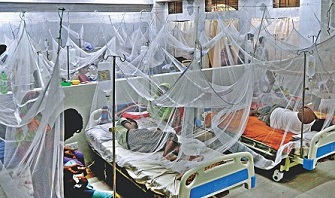Dengue News: 909 Dead And 10,470 Individuals Presently Hospitalized In Bangladesh Due To Dengue! A Looming Public Health Crisis
Nikhil Prasad Fact checked by:Thailand Medical News Team Sep 29, 2023 2 years, 4 months, 2 weeks, 1 day, 4 hours, 9 minutes ago
Dengue News: Bangladesh is currently grappling with its most severe outbreak of dengue fever in history, with 909 reported deaths so far and over 10,000 individuals hospitalized. The situation has alarmed health authorities, overwhelmed hospitals, and exposed critical shortcomings in the country's healthcare system.
 The Dengue Epidemic Unfolds
The Dengue Epidemic Unfolds
As of September 25, 2023, Bangladesh has reported a staggering 187,725 cumulative cases of dengue, with 909 recorded deaths. The weekly statistics paint a grim picture, with 20,041 new cases and 87 deaths reported in the latest week alone. This represents a significant increase from the previous week's numbers of 19,356 cases and 92 deaths.
https://reliefweb.int/report/bangladesh/dengue-situation-report-5-25-september-2023
While the situation is dire, it's important to note that this outbreak has been escalating steadily for some time.
One alarming trend is the changing demographics of dengue fatalities. Initially, the majority of deaths were among females, but recent data shows a shift, with 52% of deaths occurring among males and 48% among females during the latest reporting week. This shift could be indicative of the virus's evolving nature.
In all, a total of 445 samples have been stereotyped in this outbreak. The majority are DENV-2 (65.6%), then DENV-3 (27.4%), DENV-1 (2.5%), DENV-4 (0.2%) and the rest 4.3% are co-infection of DENV2 and DENV-3.
Dengue Fever: A Seasonal Threat Amplified by Climate Change
Dengue fever, a mosquito-borne viral infection, has been endemic in tropical countries like Bangladesh for decades. Historically, it was considered a seasonal disease, primarily affecting the country during the monsoon season from May to September. However, climate change has altered this pattern, leading to more frequent and severe outbreaks.
The exceptionally wet monsoons and rising temperatures have created ideal breeding conditions for the Aedes mosquitoes, the carriers of the dengue virus. Stagnant water in clogged drainage systems and poor sanitation in densely populated urban areas, such as Dhaka, have exacerbated the problem. These factors have contributed to the rapid and widespread transmission of the virus.
An Unprepared Health System
One of the most concerning aspects of this dengue outbreak is the unpreparedness of the healthcare system to handle the surge in cases. Hospitals across the country, particularly in the capital city of Dhaka, have been inundated with dengue patients. The sheer volume of cases has strained resources, leading to shortages of essential medical supplies, including intravenous fluids crucial for treating dengue-related dehydration.
Additionally, the influx of patients from other districts has forced the government to issue orders discouraging hospitals outside Dhaka from sending patients to the capital. This underscores the urgent need to strengthen primary and secondary healthcare facilities in rural areas to effectively manage dengue cases at the local level.
Underreporting and Data Discrepancie
s
One significant challenge in addressing the dengue crisis in Bangladesh is the underreporting and discrepancies in data. According to Dr Shahadat Hossain of the Directorate General of Health Services (DGHS), the reported cases of dengue could be four to five times higher than the government data. Many cases in rural communities go unreported, highlighting the need for better surveillance and reporting mechanisms.
Dr Hossain told
Dengue News reporters, “But the unreported number of the dengue deaths would not be that much. A rough 20% more deaths may be unreported. We reported cases after being admitted to hospitals, but there are some cases that go unreported in the community.”
Meanwhile, more than half of the new cases are from outside Dhaka, which is a new concern, said health professionals.
The Role of Public Awareness and Coordination
Efforts to combat dengue in Bangladesh have included public awareness campaigns aimed at preventing mosquito breeding grounds. However, local experts like Dr Mushtaq Hussain emphasize that these campaigns must be accompanied by more comprehensive and long-term measures. Public perception of dengue as a temporary ailment must change, with a focus on sustained prevention and control.
Coordination among government agencies, health specialists, and entomologists is crucial for effective dengue control. Regular review and assessment of anti-mosquito measures are essential to ensure their effectiveness. Improper campaigns, even with significant financial investments, may not yield the desired results.
A renowned Bangladeshi public health physician, Dr Abu Jamil Faisel blamed the coordination gaps between the government agencies and improper action by the government despite repeated warnings by health specialists and entomologists.
He gave an example in which the local health authorities often spray anti-mosquito fog but they don’t review it regularly with experts, including entomologists, to determine whether it is effective in killing dengue mosquitoes.
He warned, “If we run an improper campaign, then millions of dollars won’t bring any improvement in the ever-worsening dengue crisis.”
International Assistance and Future Outlook
Recognizing the severity of the situation, the World Bank approved a $200 million loan to help improve primary healthcare services and address the dengue crisis in Bangladesh. However, experts fear that the outbreak may persist until the monsoon season ends, which could extend into October, exacerbating the crisis further.
Conclusion
The dengue outbreak in Bangladesh serves as a stark reminder of the complex challenges posed by infectious diseases in an era of climate change. The country's healthcare system faces a daunting task in responding to the rapidly increasing number of cases. Urgent action is needed to strengthen healthcare facilities, improve reporting mechanisms, and implement effective preventive measures.
The dengue crisis in Bangladesh highlights the interconnectedness of public health, climate, and socio-economic factors. It calls for a multi-faceted approach involving international cooperation, community engagement, and proactive government intervention. Ultimately, the goal must be to not only manage the current outbreak but also build resilience to future health threats in a changing world.
For the latest
Dengue News, keep on logging to Thailand Medical News.
